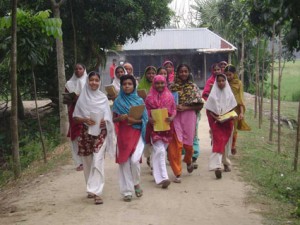 Dr Zaki Wahhaj has won an award for AUD576,683 (c £380,000) from the Australian Government’s AusAID for ‘The Role of Secondary Schooling and Gender Norms in the Long-term Opportunities and Choices of Rural Bangladeshi Women’.
Dr Zaki Wahhaj has won an award for AUD576,683 (c £380,000) from the Australian Government’s AusAID for ‘The Role of Secondary Schooling and Gender Norms in the Long-term Opportunities and Choices of Rural Bangladeshi Women’.
The project will investigate how the opportunity of secondary education for rural women in Bangladesh, made possible by the government’s gender-focused school subsidy scheme beginning in the mid-1990s, impacted upon their later lives, particularly in terms of decisions relating to marriage, childbirth, employment and investment in their own children.
Knowledge gained from the study can be used to make secondary schools in developing countries more supportive environments for adolescent girls. It will help to guide the design of adolescent development programmes – which now form a vital part of broader strategies for poverty alleviation and economic development of international development organisations and donors – so that they can complement the formal training received by adolescent girls in schools, or substitute for this formal training where girls are unable to attend secondary school.
The project will place particular emphasis on the transmission of gender norms in secondary schools – through the academic curriculum, the extra-curricular activities conducted with schools and the beliefs and attitudes of school teachers regarding traditional gender norms – to identify the role of these factors in shaping the future choices of female pupils.
The project will collect data on a random sample of 7,500 women who were of secondary school-going age around the start of the subsidy scheme, drawn from a nationwide census. The survey will gather detailed data on marriage, childbirth, employment, parental background and schooling history. In selected villages, the researchers will conduct in-depth interviews with the women, to obtain further insights about their attitudes towards traditional gender norms, and decisions regarding school, marriage, fertility and employment; to understand how access, or lack of access to secondary schooling affected their subsequent choices.
Zaki will be working with his co-investigator, Dr Niaz Asadullah, University of Reading, and a team of researchers based in Bangladesh. Zaki’s broader research focuses on the role of gender norms in household decision-making in poor countries, and on the role of social norms in the process of economic development; while Dr Asadullah specialises in the field of education in developing countries, with a focus on the education of women.
